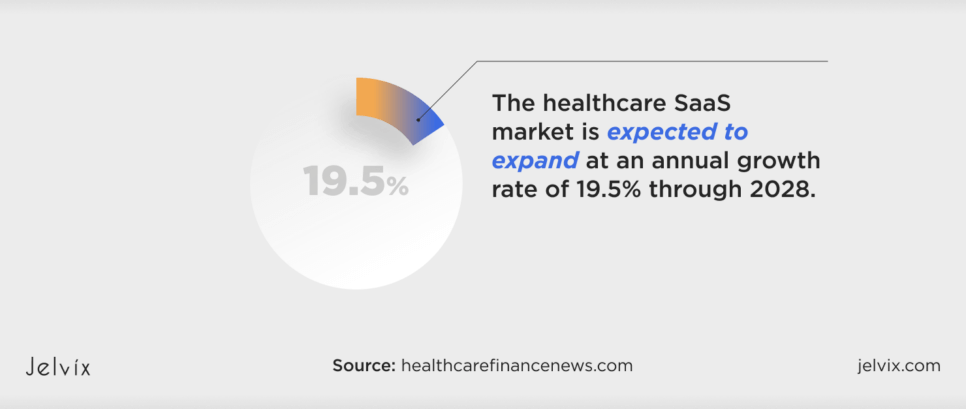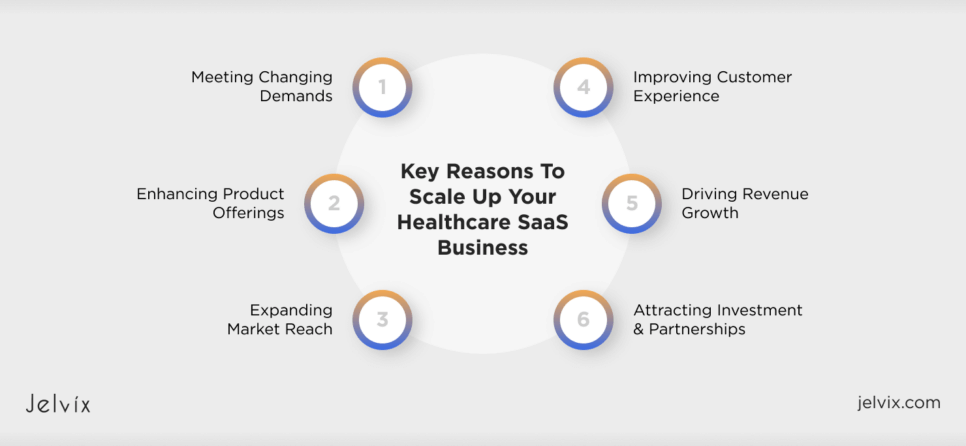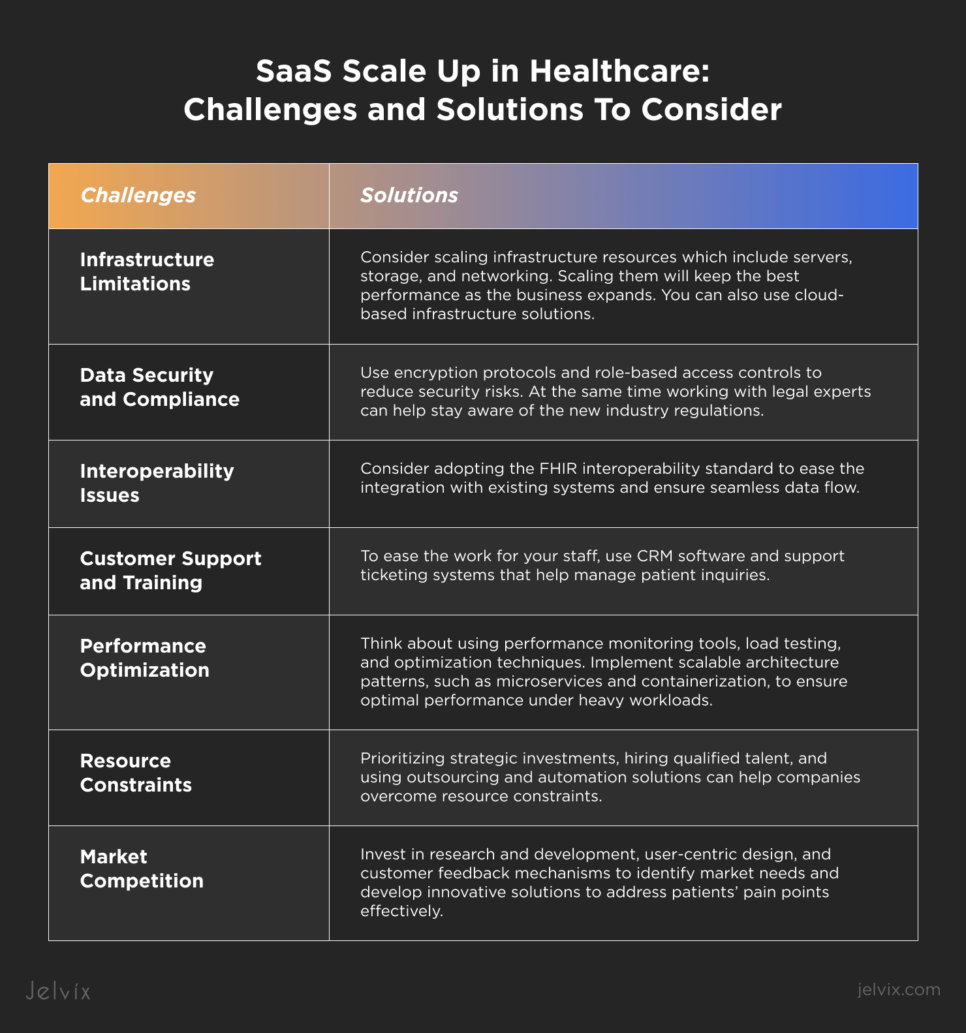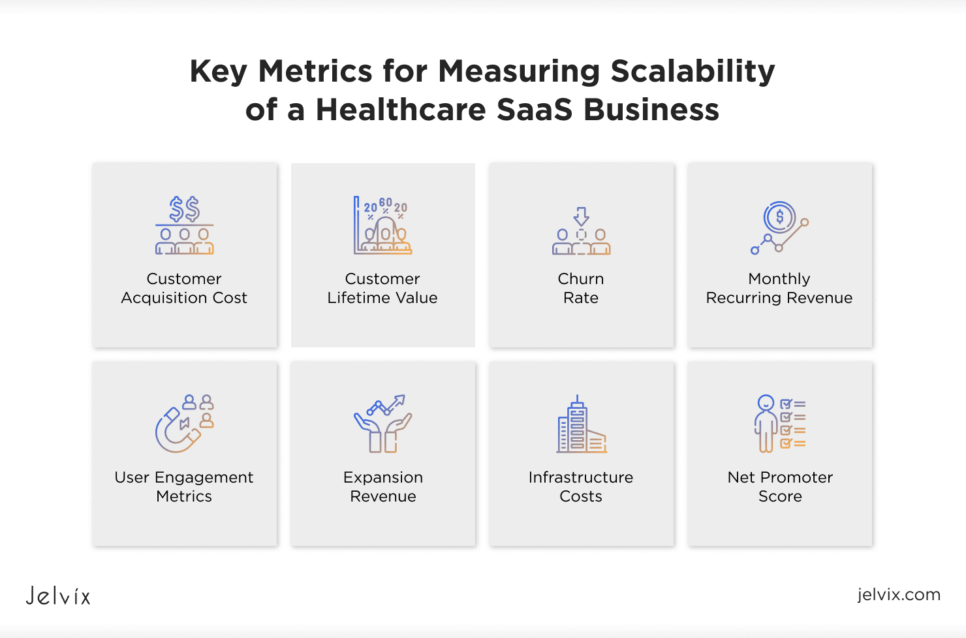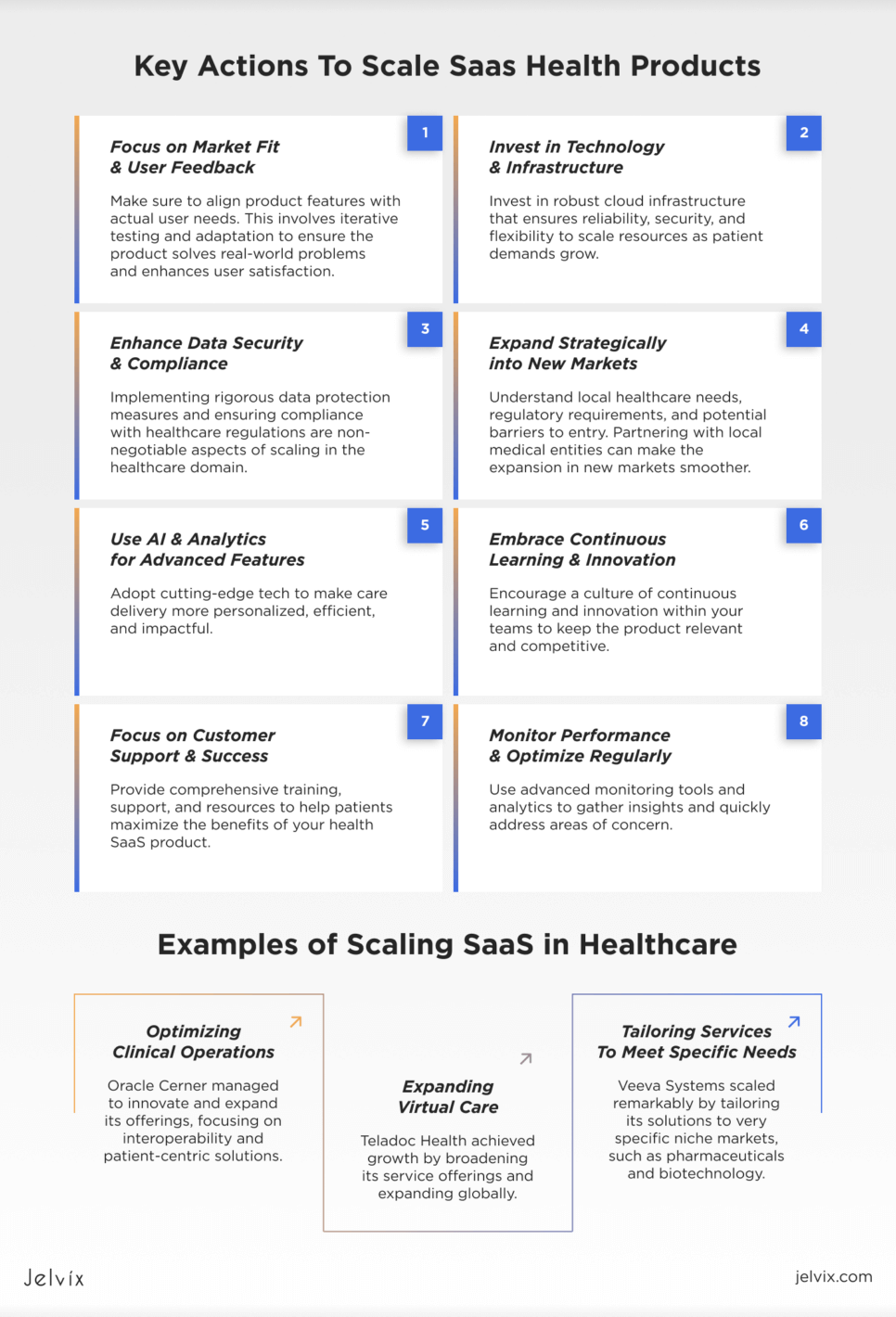Business leaders around the globe expect to receive no less than 50% of their revenues from new products by 2026. It means that SaaS companies, including those in the healthcare sector, already require upscaling to provide a wide range of services and stay competitive.
However, expanding a medical SaaS company can be challenging. The problem is that focusing too heavily on scaling up operations can result in a disruption of current processes leading to critical gaps in patient care.
If you aim to scale up your healthcare SaaS business while keeping high clinical performance, read this article. You’ll discover the common challenges of SaaS expansion, learn how to handle them, find out more about key success metrics, and get prepared for expansion with the best practices from the Jelvix team.
SaaS Scalability in Healthcare Explained
SaaS solutions are gaining popularity because of their scalability. They expand and quickly adapt to the growing needs of healthcare companies and patients, handling increasing workloads and data volumes without disrupting clinical processes. When hospitals realize they need additional features and integrations with other systems, scalable SaaS solutions can support these demands.
SaaS scalability also contributes to safe healthcare data migration when providers update their systems and make it easier to adhere to industry regulations. Whether data safety rules change or expand, SaaS solutions can easily handle the changes allowing medical companies to keep delivering care in a way that maximizes their performance and profit.
Key Reasons To Scale Up Your Healthcare SaaS Business
The healthcare SaaS market is growing quickly. It’s expected to expand at an annual growth rate of 19.5% through 2028. Medical companies are increasingly turning to SaaS solutions because they’re safe, cost-effective, and easy to integrate. This expansion helps them keep up with rising industry demands and supports their growth potential.
Meeting Changing Demands
More healthcare organizations are going digital. They need technology that can scale. SaaS tools improve patient care, optimize operations, and increase clinical efficiency. Expanding these tools allows healthcare businesses to meet current and future demands, keeping them competitive.
Enhancing Product Offerings
Scaling up allows healthcare companies to broaden their service offerings. They can add new features and functions to their platforms. This will keep them ahead of competitors and let them adapt to changing patient needs.
Expanding Market Reach
Scaling creates new opportunities letting healthcare providers grow their market. They can enter new markets by targeting new regions, specialties, and customer groups. This will help them reach a wider audience.
Improving Customer Experience
A scalable SaaS platform ensures that more patients can come on board. It also ensures the system stays secure, fast, and easy to use. An intuitive interface helps attract new patients and keeps existing ones satisfied.
Driving Revenue Growth
Growing your healthcare SaaS business can boost your revenue. You can grow and earn more by getting more customers, improving prices, and adding premium features.
Attracting Investment and Partnerships
A scalable SaaS model is also appealing to investors and potential partners. As you grow your business, it becomes more attractive in the marketplace. This opens doors to new partnerships and investments.
SaaS Scale Up in Healthcare: Common Challenges and Solutions To Consider
The challenges in SaaS expansion are typically related to infrastructure limitations, the complexity of integration, performance disruptions, and compliance with changing industry regulations. You need to address them if you want to sustain growth during scaling up, protect sensitive data, and offer exceptional medical services to patients.
Infrastructure Limitations
With the expansion of your healthcare business, your user base and workload will grow, too. Your SaaS infrastructure needs to handle this to ensure your clinic delivers care. Consider scaling infrastructure resources which include servers, storage, and networking. Scaling them will keep the best performance as the business expands. You can also use cloud-based infrastructure solutions. These include Infrastructure as a Service (IaaS) and Platform as a Service (PaaS) which offer scalable computing resources on demand.
Data Security and Compliance
Healthcare SaaS companies must follow strict data security rules like HIPAA and GDPR. Scaling up can introduce extra complexities in data privacy, security, and compliance. Implement strong data security. Use encryption protocols and role-based access controls to reduce security risks. At the same time working with legal experts can help stay aware of the new industry regulations.
Interoperability Issues
Healthcare entities often use a variety of systems and applications to manage medical records, billing, and administrative functions. Scaling a SaaS platform may involve integrating with existing medical systems, such as EHRs, practice management software, and third-party applications. Consider adopting the FHIR interoperability standard to ease the integration with existing systems and ensure seamless data flow.
Customer Support and Training
As the patient base grows, healthcare SaaS companies must scale their customer support and training efforts to meet the increasing demand for guidance. Help your patients out by implementing self-service resources, knowledge bases, and online training modules. To ease the work for your staff, use CRM software and support ticketing systems that help manage patient inquiries.
Performance Optimization
Scaling a SaaS platform requires ensuring fast response times, minimal downtime, and high availability. Performance bottlenecks, latency issues, and system outages can impact user experience and satisfaction. Think about using performance monitoring tools, load testing, and optimization techniques, such as caching, database optimization, and content delivery network integration, to address performance bottlenecks. Implement scalable architecture patterns, such as microservices and containerization, to ensure optimal performance under heavy workloads.
Resource Constraints
Healthcare SaaS companies may face resource constraints, such as limited funding, talent shortages, and time constraints when scaling up their medical business. Prioritizing strategic investments, hiring qualified talent, and using outsourcing and automation solutions can help companies overcome resource constraints.
Market Competition
As the healthcare SaaS market becomes increasingly crowded and competitive, companies may struggle with looking different from competitors. To make sure you stand out of the crowd, focus on innovation, product differentiation, and exceptional customer experience. Invest in research and development, user-centric design, and customer feedback mechanisms to identify market needs and develop innovative solutions to address patients’ pain points effectively.
Key Metrics for Measuring Scalability of a Healthcare SaaS Business
By monitoring key performance indicators like customer acquisition cost, churn rate, and monthly recurring revenue, companies can use data to make informed decisions about optimizing scalability, enhancing customer satisfaction, and driving growth.
Customer Acquisition Cost
Monitoring the cost related to acquiring new customers is needed to assess the scalability of a healthcare SaaS business. By tracking CAC over time, companies can evaluate the effectiveness of their marketing and sales efforts and optimize patient acquisition strategies to scale efficiently.
Customer Lifetime Value
Analyzing the lifetime value of customers helps SaaS businesses understand the long-term revenue potential of their patient base. By comparing CLV to CAC, companies can determine the ROI from acquiring new customers and make decisions about resource allocation and retention initiatives.
Churn Rate
Measuring the churn rate, or the rate at which customers discontinue their subscriptions, helps assess patient retention and business sustainability. By identifying factors that add to churn, medical companies can improve patient loyalty and maximize revenue growth.
Monthly Recurring Revenue
Tracking monthly recurring revenue provides insight into the predictable revenue stream generated from subscription-based services. By analyzing MRR growth rates and trends, companies can measure their scalability and identify opportunities to increase revenue through upselling, cross-selling, and expanding product offerings.
User Engagement Metrics
Monitoring engagement metrics, such as active users, session duration, and feature adoption rates, helps medical SaaS companies understand how patients interact with their platform. By optimizing user engagement through product enhancements and improving user experience, companies can drive platform use and increase business scalability.
Expansion Revenue
Assessing expansion revenue generated from existing patients is needed to evaluate scalability. By focusing on expanding revenue opportunities within the existing customer base, medical entities can drive sustainable growth and enhance scalability without relying solely on acquiring new customers.
Infrastructure Costs
Infrastructure costs usually include OpEx (operating expenses) hosting, storage, and computing resources. Assessing these costs is essential for managing expenses and optimizing scalability. By using cloud-based infrastructure and monitoring resource use, medical facilities can scale their operations efficiently and support growing customer demands.
Net Promoter Score
Measuring customer satisfaction and loyalty through NPS surveys helps healthcare companies measure the overall customer experience and identify areas for improvement. By gathering feedback from patients and addressing their concerns, clinics can establish positive relationships with patients, drive their loyalty, and support scalable growth.
How To Scale a SaaS Business: Top Strategies for Growth and Profitability
Scaling a SaaS business requires a strategic approach to planning and execution if you want to support growth while maintaining high performance. The Jelvix team recommends following several proven strategies to scale your SaaS business effectively.
Invest in Scalable Infrastructure
Make sure your technology can grow with your business and handle increased workloads. Use flexible cloud-based services and platforms that offer scalability and elasticity. This will allow you to easily expand resources such as computing power, storage, and bandwidth as needed.
Prioritize Data Security and Compliance
Make sure to comply with healthcare regulations such as HIPAA and GDPR. Implement strong encryption algorithms like AES and RSA, multi-factor authentication, and role-based access controls to safeguard patient data from potential breaches and leaks. Also, conduct security audits to identify vulnerabilities in your SaaS platform’s safety measures.
Use Data Analytics
Gain insights into user behavior, product performance, and market trends with data analytics. Use the received data to guide decision-making, improve user experience, and identify new market opportunities. Data-driven strategies can significantly enhance the effectiveness of your scaling efforts.
Enhance Customer Value Through Innovation
Continuously improve and expand your product offerings to keep up with the changing needs of the healthcare industry. Develop new features and services that can solve more problems for your customers. This will help strengthen patient retention and attract new clients looking for innovative approaches to care.
Invest in Talent Acquisition and Development
Build a skilled and knowledgeable team that can drive business growth and innovation. Invest in talent acquisition, training, and professional development programs to attract and retain top talent in software development, data analytics, healthcare domain expertise, and customer support. Empower your employees to put their ideas, skills, and expertise to drive organizational success.
Stay Agile and Adaptive
Embrace an agile and adaptive approach to business operations, product development, and decision-making. Stay responsive to changing market dynamics, customer needs, and competitive pressure. Continuously monitor key performance indicators, market trends, and customer feedback to inform your decisions and adjust your business strategy accordingly.
Form Strategic Partnerships
Forming partnerships and alliances in healthcare can help accelerate your scale-up process. Partnerships can provide access to new customer bases, additional resources, and enhanced credibility. Look for complementary businesses that can benefit from your SaaS solution, such as medical device companies, healthcare providers, and other tech companies that offer different but complementary services.
Examples of Scaling SaaS in Healthcare: Real-World Success Stories
Successful SaaS scaling up in healthcare can include various aspects, from broadening service lines and entering new markets to focusing on niche sectors with high compliance demands. Analyzing the real-world success stories of such advancements can help you understand what direction to choose for your business scale-up and what outcomes you can expect.
Optimizing Clinical Operations
Oracle Cerner provides an EHR platform that is adopted across healthcare facilities worldwide, largely due to its integration capabilities and analytics. Cerner managed to innovate and expand its offerings, focusing on interoperability and patient-centric solutions. This approach helped hospitals and clinics optimize their operations and improve patient outcomes.
Expanding Virtual Care
Teladoc Health is a good example of successful scaling in the telemedicine space. The company achieved growth by broadening its service offerings and expanding globally. Teladoc uses its scalable platform to integrate with various health systems and insurance providers, making virtual care visits more accessible.
Tailoring Services To Meet Specific Needs
Veeva Systems specializes in cloud-based software for the global life sciences industry. The company scaled remarkably by tailoring its solutions to very specific niche markets, such as pharmaceuticals and biotechnology. Veeva’s focus on delivering high-value, compliant, and customizable products enabled it to become essential to the operations of numerous leading pharma companies.
Learn how to distinguish between various clinical trial management software options and select the one that aligns with your healthcare business needs.
Key Actions To Scale Saas Health Products: a Short Guide from Jelvix
Scaling a health SaaS product involves a blend of innovation, market understanding, and operational accuracy. As an experienced tech partner in healthcare software development, the Jelvix team suggests that you follow a step-by-step guide to expand your medical SaaS offerings effectively.
1. Focus on Market Fit and User Feedback
Understanding the market demand and continuously gathering user feedback is your first step to success. Make sure to align product features with actual user needs and market requirements. This involves iterative testing and adaptation to ensure the product solves real-world problems and enhances user satisfaction.
2. Invest in Technology and Infrastructure
The scalability of a health SaaS product is dependent on its technical foundation. Invest in robust cloud infrastructure that ensures reliability, security, and flexibility to scale resources as patient demands grow. Make use of modern architectures like microservices to perform updates and maintenance easier and faster.
3. Enhance Data Security and Compliance
Because of the sensitive nature of health data, medical entities need to prioritize data security and regulatory compliance. Implementing rigorous data protection measures and ensuring compliance with healthcare regulations are non-negotiable aspects of scaling in the healthcare domain.
4. Expand Strategically into New Markets
Consider geographical and demographic expansion. This includes detailed market research to understand local healthcare needs, regulatory requirements, and potential barriers to entry. Partnering with local medical entities can make the expansion in new markets smoother.
5. Use AI and Analytics for Advanced Features
Integrating AI and analytics can significantly enhance the capabilities of your medical SaaS product, from predictive analytics in patient care to operational AI in workflow management. Adopt cutting-edge tech to make care delivery more personalized, efficient, and impactful.
6. Continuous Learning and Innovation
Healthcare tech changes all the time, so stay updated with the latest advancements and industry trends. Encourage a culture of continuous learning and innovation within your teams to keep the product relevant and competitive.
7. Focus on Customer Support and Success
Ensuring excellent ongoing customer support and success programs is what you need for customer retention and expansion. Provide comprehensive training, support, and resources to help patients maximize the benefits of your health SaaS product.
8. Monitor Performance and Optimize Regularly
Regularly monitor your system’s performance, user engagement, and financial metrics to understand the health of your business. Use advanced monitoring tools and analytics to gather insights and quickly address areas of concern. This way, you’ll ensure sustained growth and the system’s reliability.
If you want to learn more about ways to support your healthcare business growth without compromising your SaaS systems’ performance and quality, reach out to our experts. They will guide you on possible solutions and help you decide on the next steps for scaling up your SaaS business in healthcare.
Top Trends in Hospital SaaS Software Development
The SaaS software development market is growing rapidly. The key drivers include technological advances, changing healthcare regulations, and high patient expectations. Some trends stay on top dictating how SaaS solutions will develop in the future.
Telemedicine Expansion
The COVID-19 pandemic greatly increased the demand for telemedicine platforms. Modern healthcare providers are seen to adopt robust, scalable, and secure telemedicine solutions that provide seamless patient-doctor interactions remotely.
Artificial Intelligence and Machine Learning
AI and ML are increasingly being integrated into healthcare SaaS because of their ability to support decision-making, diagnostic accuracy, and comprehensive patient management. These technologies are being used to automate administrative tasks, analyze medical imaging, assist physicians in decision-making, and predict patient outcomes with greater precision.
Increased Use of Wearables and IoT
The integration of wearables and IoT devices with healthcare SaaS platforms is on the rise. Developers are focusing on creating software that can collect, analyze, and effectively use data from these devices to monitor patient health remotely.
Personalized Healthcare
Personalization is becoming a key component in healthcare software development. This trend is leading to the creation of sophisticated analytics tools within SaaS platforms that can help predict individual health needs and advise on further actions.
Big Data Analytics
Big data is playing an increasingly important role in healthcare SaaS development. By using big data, providers can get accurate healthcare insights, improve the efficiency of health services, and optimize operational processes.
How Jelvix Can Help Your SaaS Company Scale Up
The SaaS healthcare environment is pretty dynamic, driven by numerous factors like the development of modern tech, growing patient expectations, and changing market demands. Companies that want to meet all the changes while keeping their SaaS solutions competitive need to accurately plan the scale-up and follow the best practices to ensure exceptional patient care.
If you need assistance in expanding your SaaS company or want to modernize or automate your clinical processes, the Jelvix team is here to help. Our experts can provide you with a consultation based on your current and future SaaS business goals and help find the best solution to scale while keeping the ongoing processes efficient. Reach out anytime to request help.
Looking for a technology partner?
Achieve business goals with our dedicated healthcare software development team.


